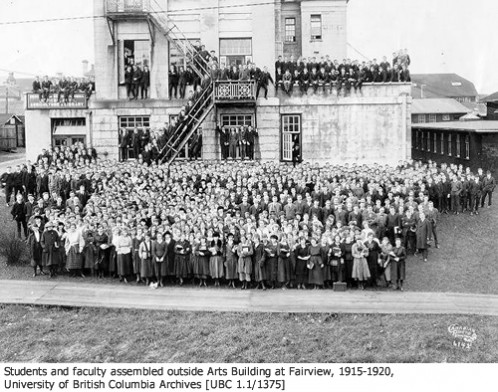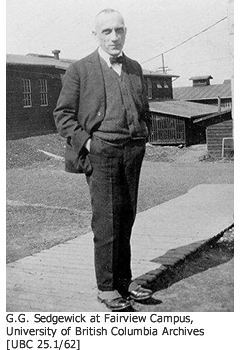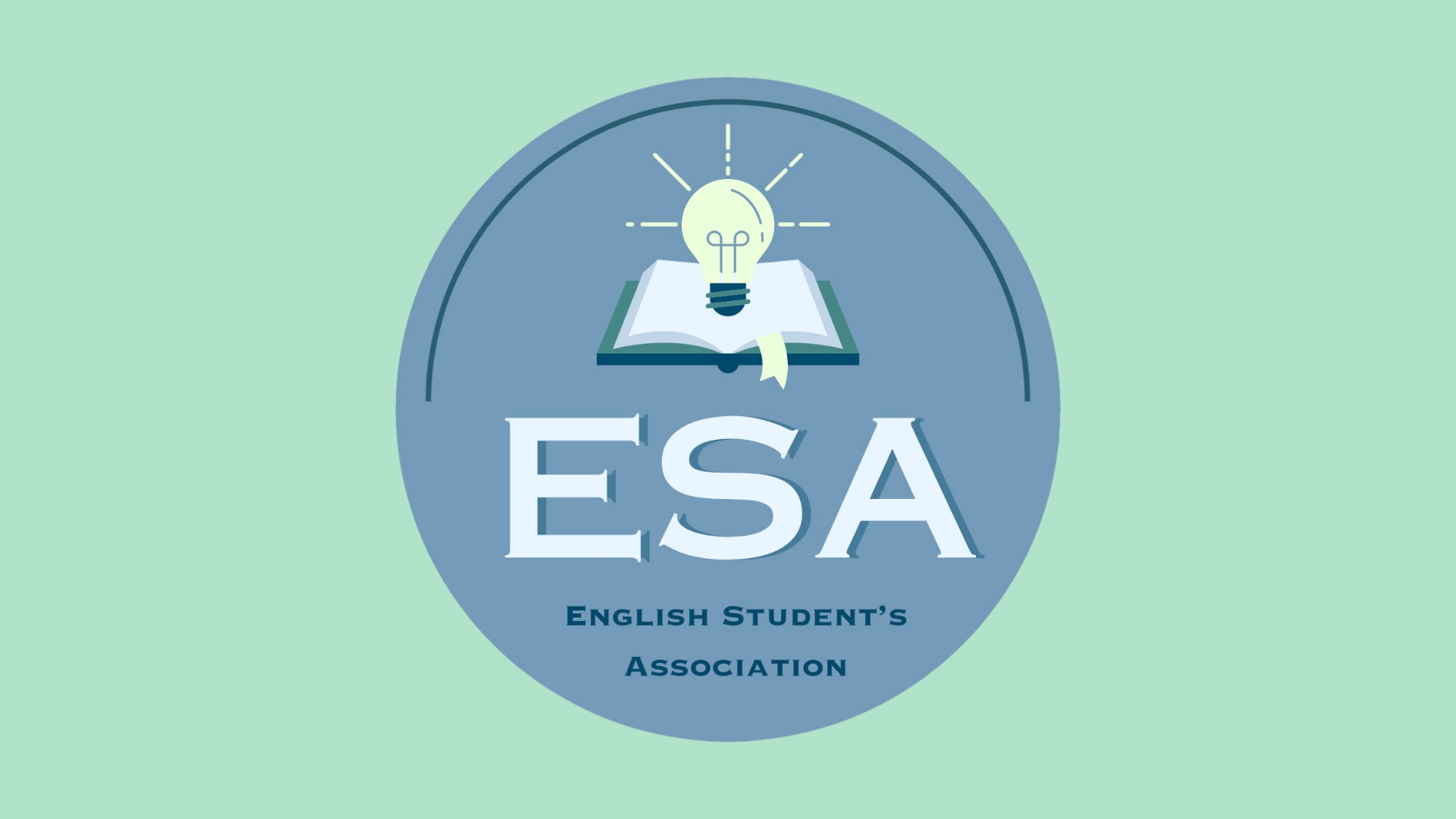

Students and faculty assembled outside Arts Building at Fairview, 1915-1920, University of British Columbia Archives UBC 1.1/1375
When UBC first opened its doors in September 1915, English was a required subject for all students. In the Faculty of Arts (which at that time included programs in science), students were expected to take English in at least three of the four years leading to a bachelor’s degree. Students in the Faculty of Applied Science were also given a summer reading list that included substantial works by Kingsley, Dickens, and George Eliot, and tested upon their return to campus in September. The UBC Calendar for 1915-16 informed applicants to Mining Engineering, “In view of the importance of accuracy of expression in the case of those engaged in scientific or professional work, a course on English composition is prescribed for all undergraduates of the first year”, and warned that admission to second year was conditional upon success in English composition. Despite the ubiquity of English requirements, however, the English Department began life in 1915 with only two faculty members: Assistant Professor Joseph Kaye Henry, B.A. (Dalhousie), inherited from UBC’s predecessor McGill University College of British Columbia, and Frederic G. C. Wood, a McGill BA with a master’s from Harvard who was appointed as an instructor and promoted to Assistant Professor in 1916. The impact of Wood’s appointment would be far-reaching: upon his arrival he founded and directed the UBC Players’ Club, a popular student dramatic society that laid the foundations of UBC’s strong theatrical tradition.


G.G Sedgewick at Fairview Campus, University of British Columbia Archives, UBC 25.1/62
With the end of the Great War, enrolment at UBC began to climb, and the demands upon the fledgling department were such that a third appointment was soon deemed necessary. In 1918 Garnett Gladwin Sedgewick, a graduate of Dalhousie and Harvard, was recruited as an Associate Professor; two years later he was promoted to Professor and appointed first Head of the English Department, a position he would hold for almost three decades. Sedgewick brought to UBC a love for the “classical” tradition of English studies that he inherited from his own teachers, especially Harvard professor George Lyman Kittredge, in his day a leading critic in the works of Chaucer and Shakespeare. It was around these two authors in particular that Sedgewick would build his own reputation as a fine, if somewhat eccentric, teacher. His renown extended beyond the campus, thanks to a weekly column he wrote for the Vancouver Sun and occasional talks he gave on local radio in the nineteen-thirties and forties. Despite his autocratic style and somewhat peremptory manner, students flocked to his lectures, and many were inspired by his example to follow him into English studies, some to become his colleagues at UBC, among them Dorothy Blakey Smith, Dorothy Mawdsley, Earle Birney, William Robbins, Roy Daniells, and Philip Akrigg. The young Department soon built up a reputation for the high quality of its teaching, but scholarship was not neglected: Thorleif Larsen, a Toronto graduate and Rhodes Scholar who joined the Department in 1919, was a recognized Elizabethan specialist and became the Department’s first FRSC in 1935. Sedgewick’s 1934 Alexander lectures at the University of Toronto were published as a much-admired book, Of Irony: Especially in Drama (1935), and Sedgewick would himself become a member of the Royal Society in 1946.
The last years of Sedgewick’s headship saw a huge (though temporary) leap in the size of the Department, from a dozen faculty members to over forty, as the University sought to cope with the influx of returning veterans after the end of the Second World War. New arrivals, notably Roy Daniells and Earle Birney, brought with them new ideas, and the Department soon began offering courses in creative writing (under Birney), theatre practice (taught by Dorothy Somerset, later the first Head of Theatre), and Canadian literature (at first covered in “English Literature of the American Continent” and taught by Reg Watters). Daniells was made Head in 1948, and in that role oversaw the rapid growth of the Department at a crucial time in its history. Through a series of carefully-chosen appointments, he opened up the curriculum to newly-developing fields in British, American, and Canadian literature; at the same time he steadily maintained the Department’s traditional role as provider of English courses to the rest of the University. English also expanded well beyond the campus gates: from 1961 to 1963, the Department sent Faculty members up to Prince George to teach first and second year courses, mainly to teachers working towards their degree; one of the volunteers was Ron Baker, who would later become the first Head of the English Department at Simon Fraser University and subsequently the founding president of the University of Prince Edward Island. These years were not without internal dissension. By the early sixties, Earle Birney, already recognized as a major writer and the winner of two Governor General’s awards, had aroused enough interest and support to be able to fashion and chair a creative writing program, and he argued strongly for its independence from English. In 1964 Roy Daniells acceded to the pressure, but supported the appointment of CBC regional director Robert Harlow, a former student of Birney’s, as Head of the new department. Disappointed, Birney left UBC, ostensibly on a year’s leave of absence, but he did not return.


Dorthy Blakey Smith and Dean Dorthy Mawdsley, 1945, University of British Columbia Archives, UBC 68.1/19
The 1950s and 1960s saw a steady influx of new faculty members from the U.S. and Britain, and with them came a growing interest in contemporary literature. Modern American and Canadian poetry found new disciples among the students of Warren Tallman (appointed in 1956), among them George Bowering, Fred Wah, Daphne Marlatt, and Frank Davey, the founders in 1961 of the influential poetry magazine TISH at UBC. The study of Canadian literature was given an additional boost by the appearance in 1959 of the UBC quarterly Canadian Literature, the first journal dedicated to the critical study of Canadian writing. Roy Daniells appointed British writer George Woodcock, then a lecturer in the English Department, as founding editor. The same year saw the appearance of Prism,an English Department magazine promoting original poetry and prose, with Jan de Bruyn at the helm (the magazine would change editors and move to the new Department of Creative Writing in 1965).
The Department’s growth in size and scope was accompanied by greater emphasis on the importance of published scholarship. The arrival of Pre-Raphaelite scholar W. E. (“Dick”) Fredeman in 1956 gave new vigour to Victorian studies, and Fredeman’s unbridled enthusiasm for rare books led in the mid ‘sixties’ to his expedition to the UK, accompanied by University Librarian Basil Stuart-Stubbs, to buy books and manuscripts for the UBC Library with funds from a $3 million donation by forest magnate H. R. MacMillan. On that trip they acquired not only a major collection of Victorian books, but also the collector himself, Norman Colbeck, who settled in Vancouver, spent the next twenty years cataloguing his former collection, and married English Department member Mabel Mackenzie. At the same time, even as research began to play a more prominent role in considerations of tenure and promotion, the Department continued to devote much of its energy to the provision of service courses. English 100 catered to all first-year students, and was by far the largest course in the University. Until 1968, English 200 (the survey course covering literature from Chaucer to the nineteenth century) was taken by all students pursuing a degree in the Faculty of Arts. The Department also supplied writing courses required of second-year students in Applied Science and Forestry; as well, an arrangement with Education brought a team of instructors from that Faculty to teach the Department’s intermediate composition course in sections limited to students in elementary and secondary education.
In 1965 Roy Daniells stepped down as Head, his contribution recognized by his being named the first UBC University Professor. By this time the Department had established itself as a centre of wide-ranging scholarship and home to some outstanding researchers, notably in medieval and early modern literature. One index of its standing was the selection of Vancouver as the site of the first-ever World Shakespeare Congress in 1971. The UBC English Department was heavily involved: J. A. Lavin acted as Executive Secretary to the Conference, Reg Ingram presented on Shakespeare and music, and Roy Daniells was the invited speaker at the closing banquet. Another measure of success was the increasing number of English Department faculty named to the Royal Society of Canada: Daniells was the third to be so recognized, in 1950, and four more would follow him in the 1970s. (By 2010 the Department could boast an accumulated total of seventeen FRSCs.) The graduate program was expanding: the Department had offered a master’s degree since 1919 (the second MA ever awarded at UBC was gained in that year by English graduate Isobel Harvey), and in 1962 the first PhD in English was bestowed on Chaucerian scholar Beryl Rowland. The graduate program grew rapidly thereafter, attracting applicants from around the world and eventually becoming one of the largest in the country. The quality of the Department’s teaching was formally recognized in 1970 when John Hulcoop was named a Master Teacher in only the second year of the University-wide award (he had been a runner-up the previous year). Geoffrey Durrant (Head, 1966-69), Moses Steinberg, and Donald Stephens would be similarly honoured before the award was suspended in the late 1970s.
Though there was much to celebrate in these achievements, the Department found itself increasingly caught up in the restiveness and turmoil felt across the university system in Canada and the US in the late sixties and early seventies, leading Geoffrey Durrant to step down from the headship so that he might devote more time to his teaching and research. His successor, Robert Jordan, spent much of his term as Head (1969-81) in dealing with problems posed both from inside the Department and from without. Students demanded changes in the curriculum, reinforcing their views with “teach-ins”; the English faculty demanded more of a say in running departmental affairs and determining the standards for tenure and promotion. Despite internal wrangling, however, the Department continued to strengthen its claim to be recognized as one of the premier English departments in Canada, with a growing complement of scholars who would bring real distinction to UBC, notably a strong group of Canadianists led by W. H. New, a leading figure in the study of Canadian and Commonwealth literature and George Woodcock’s successor as editor of Canadian Literature. This period also saw a steady rise in the number of women in the professoriate, along with the emergence of feminist research in the humanities. Productive scholars like Sherrill Grace (an authority on Canadian art, history, and drama, who would become President of Academy I of the RSC) and Eva-Marie Kröller (a Canadianist and comparatist who would follow Bill New as editor of Canadian Literature)brought new breadth and insight into Canadian and postcolonial studies. The teaching of drama, always a strong element of the Department’s offerings, was invigorated by an influx of theatre-oriented scholars including Errol Durbach and Jerry Wasserman, both actors in their own right who would at different times serve as Head of the Theatre Department. Rhetoric and composition were given new prominence with the appointment in 1977 of Andrea Lunsford (later to become director of the program in writing and rhetoric at Stanford University), whose lunchtime  lectures on writing the academic essay produced overflow audiences that even the legendary Sedgewick might have envied.
The eighties saw a consolidation of the Department’s strengths: under Ian Ross, biographer of Adam Smith and Head from 1982-87, relative peace was restored, political rivalries declined, and the Department found new administrative stability. Despite fiscal problems that were beginning to plague the University, English held its strength in numbers (over 80 full-time members in 1985) primarily because it continued to perform its service function for undergraduates in every Faculty. The Department’s teaching and research in language, traditionally philological in its emphasis, took a more linguistic approach with several key appointments. The ‘seventies and ‘eighties also saw an expansion of the Department’s off-campus teaching, notably courses offered as part of the Native Indian Teacher Education Program (NITEP) and distance education programs in centres like Kamloops and Prince George, to which instructors were sometimes dispatched on week-long expeditions to teach face-to-face classes in composition. The Department’s reach into other areas of the University was extended through administrative oversight of independent programs such as Comparative Literature and Women’s and Gender Studies. Jerry Wasserman helped to give the Department a profile in the external community by his role as a drama critic for CBC Radio, Vancouver; a similar role was performed by noted Victorianist and biographer Ira Nadel, who reviewed new books for the CBC for over a decade.
During the last years of the century the Department, now headed by Herbert Rosengarten (1987-97), grew in some areas and shrank in others. In 1991 the Department bade farewell to its venerable first-year course in literature and composition, English 100, replacing it with a program of first-year courses offering greater choice and variety to in-coming students. The transformation of the first-year offerings heralded a number of other changes experienced by the Department. Fiscal retrenchments by the University Administration saw Arts particularly hard hit, and faculty numbers in English began to decline as retirees were not replaced. Student numbers did not decline, however, and the Department was hard pressed to meet all its commitments. Despite such difficulties, the English Honours program, established in 1920 and long recognized as one of the best in Canada, continued to flourish, as did the graduate program, attracting students to English by new courses in postcolonialism, deconstruction, and cultural studies. Students were drawn too by the Department’s growing reputation for research as reflected in members’ success in research awards, both internal and external; a complete list is provided on the Department’s website, but for the period covered by this brief history mention should be made of the Jacob Biely Faculty Research Prize, UBC’s premier research award, won by Bill New in 1994 and Sherrill Grace in 1998. The Department’s excellence in teaching also won acclaim: awards for teaching, now Faculty-based, were reintroduced in 1990, and over the next ten years, eleven faculty members from English were thus distinguished.
As interest in interdisciplinarity and multidisciplinarity grew across the University, members of the Department became increasingly involved in collaborative cross-boundary teaching and research in areas such as law, medicine, and First Nations studies. The Department was well represented by faculty and student membership in Green College, a graduate residential college established in 1993 to foster interdisciplinarity; indeed, one of its first English Department members, Mark Vessey, would eventually become its Principal. Fresh approaches to language and literature were also made possible by the application of the computer to studies in the humanities. A computer lab for English graduate students was established in the mid-nineties, and one of the first on-line academic journals in the field of English, Early Modern Literary Studies, began life at UBC in 1995 under the guiding hand of Ray Siemens, then a graduate student in the Department, later Research Chair in Humanities Computing at the University of Victoria.
With Sherrill Grace at the helm (Head, 1997-2002), the English Department at UBC entered the twenty-first century as one of the most active and productive in the country, its faculty members recognized for their adventurous and original scholarship by awards at the national and international levels, and by their election to positions in numerous national and international professional bodies. For their exceptional contributions to the development of Canadian scholarship, Roy Daniells and Bill New were appointed to the Order of Canada. Graduates of the Department could be found in colleges and universities across the country, some occupying senior posts as Deans or Presidents, others acknowledged as leaders in their field. The Department’s achievements over the first eighty-five years of its existence owed much to a succession of supportive Deans in the Faculty of Arts, notably Robert M. Will, a strong proponent of the importance of the arts and humanities in higher education. It also enjoyed the services of a loyal and dedicated office staff, many of whom became good friends of both faculty and students; over the years this helped to create a sense of community and good fellowship among the members of what may have seemed to outsiders a somewhat unruly collection of outspoken, strong-minded, and (on occasion) irrepressibly combative individuals.
Herbert Rosengarten is the co-author (with Eric Damer) of UBC: The First 100 Years.
He served as Head of the Department of English and Executive Director of the President’s Office.


